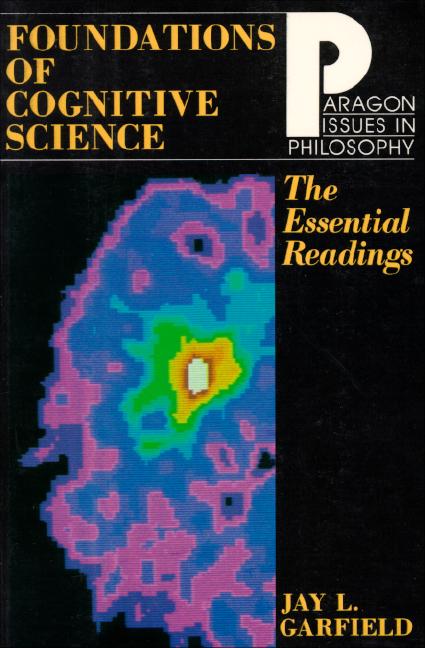Intended as a reader in the philosophical foundations of cognitive science, this book is structured to corroborate with James Fetzer's text, The Philosophy and Cognitive Science. The essays collected here present alternative and sometimes conflicting positions on the issues raised in that text. The host of essay writers include Pylyshyn, Lucas, Fodor, and Chomsky. Each section opens with an essay explaining the principal questions addressed, the importance of these questions in the philosophical foundations of cognitive science, and the range of positions taken with respect to them.
TABLE OF CONTENTS
Acknowledgments
Preface
Introduction
Jay L. Garfield
PART I. CRITICAL DISTINCTIONS
1. Convention, Context, and Meaning: Conditions on Natural Language
Understanding
Jay L. Garfield
2. Computation and Cognition: Issues in the Foundations of Cognitive
Science
Zenon W. Pylyshyn
3. Epistemics: The Regulative Theory of Cognition
Alvin I. Goldman
4. Three Kinds of Intentional Psychology
Daniel Dennett
PART II. COMPUTATION THEORY IN COGNITIVE SCIENCE
1. Computer Science as Empirical Inquiry: Symbols and Search
Allan Newell and Herbert A. Simon
2. The Four-Color Problem and Its Philosophical Significance
Thomas Tymoczko
3. Lucas’ Number Is Finally Up
G. Lee Bowie
4. Why I Am Not a Turing Machine: Gödel’s Theorems and the Philosophy
of Mind
Thomas Tymoczko
PART III. ARTIFICIAL INTELLIGENCE
1. Minds, Brains, and Programs
John R. Searle
2. Selected Replies to Searle from Behavioral and Brain Science
Bruce Bridgeman, Daniel Dennett, Jerry A. Fodor,
John Haugeland,
Douglas Hofstadter, William G. Lycan, and Zenon
W. Pylyshyn
3. Modules, Frames, Fridgeons, Sleeping Dogs, and the Music of the
Spheres
Jerry A. Fodor
4. Artificial Intelligence as Philosophy and as Psychology
Daniel Dennett
PART IV. HUMAN INTELLIGENCE
1. Ecological Optics
J. J. Gibson
2. How Direct Is Visual Perception? Some Reflections on Gibson’s “Ecological
Approach”
Jerry A. Fodor and Zenon W. Pylyshyn
3. Grammar, Psychology, and Indeterminacy
Stephen Stich
4. What the Linguist Is Talking About
Noam Chomsky and Jerrold Katz
PART V. NEW FRONTIERS
1. $RESTAURANT Revisited or “Lunch With BORIS”
Michael G. Dyer
2. The Role of TAUs in Narratives
Michael G. Dyer
3. Moving the Semantic Fulcrum
Terry Winograd
4. An Introduction to Connectionism
John L. Tienson
5. Understanding Natural Language
John Haugeland
References
Index
JAY L. GARFIELD is a professor of philosophy in the School of Communications and Cognitive Science at Hampshire College. He is also a member of the core faculty at the University of Massachusetts Cognitive Science Institute. His previous books include Belief in Psychology: A Study in the Ontology of Mind, Cognitive Science: An Introduction, and Meaning and Truth: The Essential Readings in Modern Semantics.




